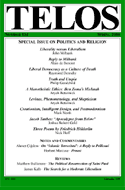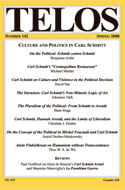By Francisco Unger · Tuesday, March 23, 2010 On Tuesdays at the TELOSscope blog, we reach back into the archives and highlight an article whose critical insights continue to illuminate our thinking and challenge our assumptions. Today, Francisco Unger looks at John Milbank’s “Liberality versus Liberalism,” from Telos 134 (Spring 2006).
 John Milbank’s article “Liberality and Liberalism,” as evidenced by its suggestive title, pulls some of the conventional punches. There is a dichotomy between the values of the Enlightenment-affected liberal mindset and the real turnout of liberal institutions. Crass egotism in the market, chilled international relations, and a profaned life for the individual are the fruits of a social model that bases itself on supposedly “natural” conditions of humanity and utility. The unconventional part of Milbank’s critique rests precisely in his religious foundations. He wants a revival, or perhaps the birth, of radical social criticism based on Catholic theology. There is probably some ire to Milbank’s voice, because he is challenging a liberalism that thought it had put such religious dissidence to rest—therein the “liberality” of the marketplace, in which all are accommodated and all space is taken over. But Milbank believes post-Enlightenment efforts for reform based on secular grounds have mostly come to naught. Looking around in the present day, the reader is likely sympathetic. The entrance of divine grace into human life, the Christian guiding light of charity, and the notion of an exchange of gifts as the only fair exchange (non-exploitative), are all solutions to our unhappy liberal aporia. At least that is Milbank’s story. John Milbank’s article “Liberality and Liberalism,” as evidenced by its suggestive title, pulls some of the conventional punches. There is a dichotomy between the values of the Enlightenment-affected liberal mindset and the real turnout of liberal institutions. Crass egotism in the market, chilled international relations, and a profaned life for the individual are the fruits of a social model that bases itself on supposedly “natural” conditions of humanity and utility. The unconventional part of Milbank’s critique rests precisely in his religious foundations. He wants a revival, or perhaps the birth, of radical social criticism based on Catholic theology. There is probably some ire to Milbank’s voice, because he is challenging a liberalism that thought it had put such religious dissidence to rest—therein the “liberality” of the marketplace, in which all are accommodated and all space is taken over. But Milbank believes post-Enlightenment efforts for reform based on secular grounds have mostly come to naught. Looking around in the present day, the reader is likely sympathetic. The entrance of divine grace into human life, the Christian guiding light of charity, and the notion of an exchange of gifts as the only fair exchange (non-exploitative), are all solutions to our unhappy liberal aporia. At least that is Milbank’s story.
Continue reading →
By Francisco Unger · Tuesday, December 15, 2009 Each Tuesday in the TELOSscope blog, we reach back into the archives and highlight an article whose critical insights continue to illuminate our thinking and challenge our assumptions. Today, Francisco Unger looks at Michael Marder’s article “Carl Schmitt’s ‘Cosmopolitan Restaurant’: Culture, Multiculturalism, and Complexio Oppositorum,” from Telos 142 (Spring 2008).
 Michael Marder’s essay on Carl Schmitt’s concept of complexio oppositorum, a term elaborated in Schmitt’s Roman Catholicism and Political Form (1923), takes up this “complex of opposites” as a framework for understanding culture. Marder makes the provocative argument that what is normally a decorative centerpiece in the mantle of depoliticized liberalism, “multiculturalism,” can be rescued on Schmittian grounds in order to militate against the somnolence of its former master. When it is understood as the recognition of a charged plurality, or a complex of opposite cultures, multiculturalism satisfies the need for a living politics. Cultures are not paying mere lip service to a common framework of socially entrenched goals, or to the proselytizers of universalism by day (political players by night), but now cultures are seen as vehicles for a people’s political particularity. For Marder, novels, films, languages, manners, etc., can become political weapons by which a disempowered group shatters the fiction of an all-inclusive consensus, and intrudes on the atmosphere of sterility that often accompanies liberalism’s claim to “universality.” Michael Marder’s essay on Carl Schmitt’s concept of complexio oppositorum, a term elaborated in Schmitt’s Roman Catholicism and Political Form (1923), takes up this “complex of opposites” as a framework for understanding culture. Marder makes the provocative argument that what is normally a decorative centerpiece in the mantle of depoliticized liberalism, “multiculturalism,” can be rescued on Schmittian grounds in order to militate against the somnolence of its former master. When it is understood as the recognition of a charged plurality, or a complex of opposite cultures, multiculturalism satisfies the need for a living politics. Cultures are not paying mere lip service to a common framework of socially entrenched goals, or to the proselytizers of universalism by day (political players by night), but now cultures are seen as vehicles for a people’s political particularity. For Marder, novels, films, languages, manners, etc., can become political weapons by which a disempowered group shatters the fiction of an all-inclusive consensus, and intrudes on the atmosphere of sterility that often accompanies liberalism’s claim to “universality.”
Continue reading →
|
|
 John Milbank’s article “Liberality and Liberalism,” as evidenced by its suggestive title, pulls some of the conventional punches. There is a dichotomy between the values of the Enlightenment-affected liberal mindset and the real turnout of liberal institutions. Crass egotism in the market, chilled international relations, and a profaned life for the individual are the fruits of a social model that bases itself on supposedly “natural” conditions of humanity and utility. The unconventional part of Milbank’s critique rests precisely in his religious foundations. He wants a revival, or perhaps the birth, of radical social criticism based on Catholic theology. There is probably some ire to Milbank’s voice, because he is challenging a liberalism that thought it had put such religious dissidence to rest—therein the “liberality” of the marketplace, in which all are accommodated and all space is taken over. But Milbank believes post-Enlightenment efforts for reform based on secular grounds have mostly come to naught. Looking around in the present day, the reader is likely sympathetic. The entrance of divine grace into human life, the Christian guiding light of charity, and the notion of an exchange of gifts as the only fair exchange (non-exploitative), are all solutions to our unhappy liberal aporia. At least that is Milbank’s story.
John Milbank’s article “Liberality and Liberalism,” as evidenced by its suggestive title, pulls some of the conventional punches. There is a dichotomy between the values of the Enlightenment-affected liberal mindset and the real turnout of liberal institutions. Crass egotism in the market, chilled international relations, and a profaned life for the individual are the fruits of a social model that bases itself on supposedly “natural” conditions of humanity and utility. The unconventional part of Milbank’s critique rests precisely in his religious foundations. He wants a revival, or perhaps the birth, of radical social criticism based on Catholic theology. There is probably some ire to Milbank’s voice, because he is challenging a liberalism that thought it had put such religious dissidence to rest—therein the “liberality” of the marketplace, in which all are accommodated and all space is taken over. But Milbank believes post-Enlightenment efforts for reform based on secular grounds have mostly come to naught. Looking around in the present day, the reader is likely sympathetic. The entrance of divine grace into human life, the Christian guiding light of charity, and the notion of an exchange of gifts as the only fair exchange (non-exploitative), are all solutions to our unhappy liberal aporia. At least that is Milbank’s story.  Michael Marder’s
Michael Marder’s 






